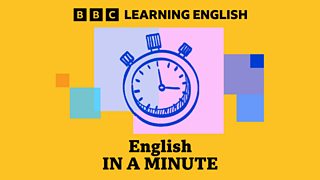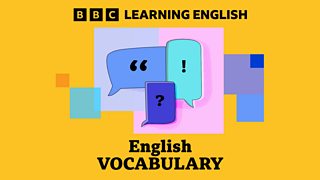Learning English Vocabulary Episodes Episode guide
-
![]()
English in a Minute: 3 ways to use 'situation'
We have a good situation here - Beth is explaining how to use the word 'situation'
-
![]()
English in a Minute: 3 ways to use 'quality'
Here's Phil with a podcast that is full of quality - listen to it and enjoy it
-
![]()
English in a Minute: 3 ways to use 'nice'
This is a nice programme all about the word ‘nice’. Beth will tell you all about it.
-
![]()
English in a Minute: 3 ways to use 'general'
In general, this is a good programme because Beth shows you how to use the word 'general'
-
![]()
English in a Minute: 3 ways to use 'count'
How many times can Phil say 'count?' Listen to the podcast and count them.
-
![]()
English in a Minute: 3 ways to use 'consider'
Phil took time to consider how to explain the word 'consider'. This is the result. Enjoy!
-
![]()
English in a Minute: 3 ways to use 'appropriate'
It is appropriate for you to listen to this podcast. Beth explains the word 'appropriate'
-
![]()
Easily confused words
Boring or bored? Learn about words that look similar but have very different meaning.
-
![]()
Easily confused words
Boring or bored? Learn about words that look similar but have very different meaning.
-
![]()
Easily confused words
Boring or bored? Learn about words that look similar but have very different meaning.
-
![]()
Easily confused words
Boring or bored? Learn about words that look similar but have very different meaning.
-
![]()
Easily confused words
Boring or bored? Learn about words that look similar but have very different meaning.
-
![]()
Easily confused words
'Sensible' and 'sensitive'. Find out more about words that are easily confused.
-
![]()
Easily confused words
We look at words like dessert and desert, bored and boring
-
![]()
Easily confused words
We look at words like dessert and desert, bored and boring
-
![]()
Easily confused words
Learn about some words that are easily confused
-
![]()
Discourse markers: showing attitude
fortunately, obviously, seriously, ideally.
-
![]()
Discourse markers: showing attitude
Fortunately, obviously, seriously, ideally. These words express our attitudes and ideas
-
![]()
Discourse markers: showing attitude
Fortunately, obviously, seriously, ideally. How do we use them?
-
![]()
Discourse Markers: Interjections
Do you know your ouch! from your ugh!? These words are called interjections.
-
![]()
Discourse Markers: Interjections
Do you know your ouch! from your ugh!? These words are called interjections.
-
![]()
Discourse Markers: Interjections
Do you know your ouch! from your ugh!? These words are called interjections.
-
![]()
Discourse Markers: Interjections
Do you know your ouch! from your ugh!? These words are called interjections.
-
![]()
Discourse Markers: Interjections
Do you know your ouch! from your ugh!? Callum and Catherine will explain.
-
![]()
Discourse markers: interjections
Ouch! Ow! Hooray! Phew! and other interjections
-
![]()
Discourse markers: Attitude
Words and phrases we use to express our attitude to what we’re saying or writing.
-
![]()
Discourse markers for showing attitude
Fortunately, obviously, seriously, ideally. These words are useful. How do we use them?
-
![]()
Discourse markers for showing attitude
'Fortunately', 'ideally'... Learn useful words to express our attitudes and ideas.
-
![]()
Discourse markers for showing attitude
What are they and how do we use them to express our attitudes and ideas? Find out here.
-
![]()
Discourse markers
Fortunately, obviously, seriously, ideally















